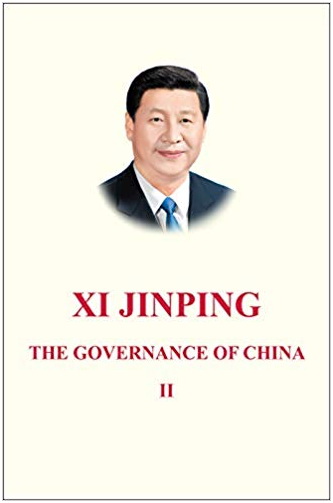Xi highlights philosophy of nation's progress
 0 Comment(s)
0 Comment(s) Print
Print E-mail China Daily, March 9, 2020
E-mail China Daily, March 9, 2020

The second volume of The Governance of China, by Chinese President Xi Jinping, reveals a political philosophy that underpins one of the most vibrant nations on the planet.
It has constructed a new theory, which makes this a book that falls into a series of earlier and later China-rooted works. In this piece, I will choose to draw attention to two dimensions of "Chineseness" this book portrays: Rootedness in socialist thought with Chinese characteristics; and the sources of change in the "principal contradiction".
The two volumes of The Governance of China chronologically succeed an earlier book (though translated later) of Xi's, namely his speeches as provincial leader in Zhejiang province. In this book he gave minute and detailed examples of how local leaders should handle the realities of what this current book calls "the productive forces" (21 instances). From the Zhejiang book, Western observers of China may grasp the material foundations of the "new era" that was entered into in 2017 (where the book ends), the era that is theorized here and that became central to the report to the 19th CPC Central Committee of 2017.
This second volume of The Governance of China sheds light on the impact of the tectonic shift that is the "new era" on China's desired contribution to the world community.
It is no coincidence that the end of the collection of speeches coincides with the famous "Davos speech" that Xi gave three years ago and that made the world leaders reckon with a China not just trying to catch up technologically, but a China that wanted to engage in international aid and rebuild the international system.
And this was not just "with Chinese characteristics" but expressing a clear acknowledgement of and even praise for a world learning from the Westphalian order that sees all nations as having equal rights and duties and the Charter of the United Nations, and delivering a distinct push for the Bandung declaration to be accorded its rightful place in the international order.
In several texts towards the end of the book, this volume of The Governance of China offers literal and forceful praise for the construction of the global order that, three years on, still provides a freshness that is welcome in today's disarrayed world.
This book, as a very clear, straight statement of what the Communist Party of China today seeks for itself and for its contribution to the world, is first of all a handbook for students of international politics and an open book on what shrewd observers, removing the layers of exoticism that have been put on China since Orientalism began, might reckon as a not so obscure civilization after all.
Here Xi frames his wishes for "China's diplomacy as a major country", in the course of three pointed but relatively modest texts that mention nine relevant regions ("peaceful development and cooperation with other countries"). "Modest", as it describes the need to work at "improving our ability to participate in global governance", not as a statement of facts but as an ongoing praxis. Regarding the spread of this engagement, the Pacific, the European Union, Africa, the Arab world, the United States and others are clearly envisaged: one would wish all major powers to be able to state their diplomatic policy in such black-and-white terms.
Policies are nothing without tools, as the book patiently and repeatedly maintains: it features four texts on the much talked-about Belt & Road Initiative. It ends at 2017 and it is for the informed public to appreciate whether or not China has been able to respond to the feedback of recipient countries, but the second BRI Summit clearly specified the need for the BRI to become environmentally sustainable.
Two aspects of Chinese society and Communist Party practice have now been made somewhat more accessible, which will certainly evoke further awe and contemplation, as well as critique and study in the West, and, for many, renewed intellectual engagement towards China, notably concerning the improvement of community-level self-governance and the centrality of the concept of modernization in the new era and of leadership as responsible for modernization.
Possibly the part of the book that demands the most intense attention is the chapter on "socialist democracy" (five texts, of which the first two are decisive). It pledges no universality and on the contrary advocates the specificity of the historical conditions of China.
It thus promotes "consultative democracy" as the requirement for the nation for its own continuation, and vouches for continued progress in it.






Go to Forum >>0 Comment(s)